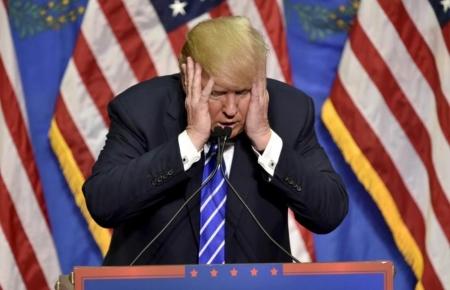Experience Matters, Obama Showed; Why You Shouldn't Vote for Carson or Trump

So when did Republicans lose their respect for experience? When did they morph into the party that values rhetoric over substance? Aren't conservatives supposed to be guided by principles of prudence and moderation? Aren't they supposed to respect longstanding institutions and established hierarchies? Why the current disdain for institutional knowledge and governmental experience in favor of novices, blowhards, and outsiders?
The explanation most often heard is the conservatives are fed up. They are sick of "politics as usual" and want a revolution in Washington. This is why they are electing representatives whose platforms are based almost exclusively on negative principles. "If I'm elected, I'll fight to repeal Obamacare. I will oppose raising the debt ceiling, I will eliminate whole departments of the federal government. I'll rip up the Iran nuclear agreement." The only problem with this approach is that not one of these things are practically achievable in the real world and in the real government.
Like candidate Carson, these representatives lack true substance, and apparently, a true desire to govern. They are able to craft an image and a message that appeals to their base but they are completely ignorant of the political apparatus they they aspire to control.
Slate's Seth Maxon sums it up nicely:
"These congressmen argue that they're the only politicians in Washington brave enough to dismantle the Affordable Care Act and defund Planned Parenthood. But it's not true — they can't do anything by themselves. It turns out bills require the approval of both the House and the president (the Senate, too!) to become law .... If they were braver ... they would risk their jobs and tell the voters who support them that they will never defund anything as long as they literally need to work with Democrats. But that would require an interest in governing that goes beyond ideological grandstanding."
An interest in governing that goes beyond ideological grandstanding. What a fascinating concept.
Conservatives find themselves in a political era in which is is virtual suicide for a Republican candidate to admit that some issues are actually pretty complicated (say, budgets, or health care, or immigration, or geopolitics), or to suggest that bipartisan compromise is a better method of governance than slash-and-burn tactics.
David Brooks recently discussed this issue in a column entitled "The Republicans Incompetence Caucus." In it, Brooks articulates the qualities necessary in a effective government leader, qualities that go far beyond a stated "belief in the Constitution" or other such vacuous claims to qualification.
"Politics," Brooks says, "is the process of making decisions amid diverse opinions. It involves conversation, calm deliberation, self-discipline, the capacity to listen to other points of view and balance valid but competing ideas and interests .... Running a government is a craft, like carpentry ...."
Referencing philosopher Max Weber, Brooks concludes, "A politician needs warm passion to impel action but a cool sense of responsibility and proportion to make careful decisions in a complex landscape. If a politician lacks the quality of detachment — the ability to let the difficult facts of reality work their way into the mind — then, Weber argues, the politician ends up striving for the 'boastful but entirely empty gesture.' His work 'leads nowhere and is senseless.'"
Given the challenges facing America today, the last thing Republicans can afford is to put forth a candidate with nothing more to offer than empty gestures. Is it too much to hope for a candidate that appreciates the realities of the political moment and possesses the skill to navigate this landscape with an eye towards the betterment of the nation? Is it too much to hope for a Republican electorate that appreciates the need for this kind of leader and accepts the reality that incremental improvement is preferable to no improvement at all?
Given the current prevailing attitudes guiding the GOP, it seems that such hopes might be too much, indeed.





















